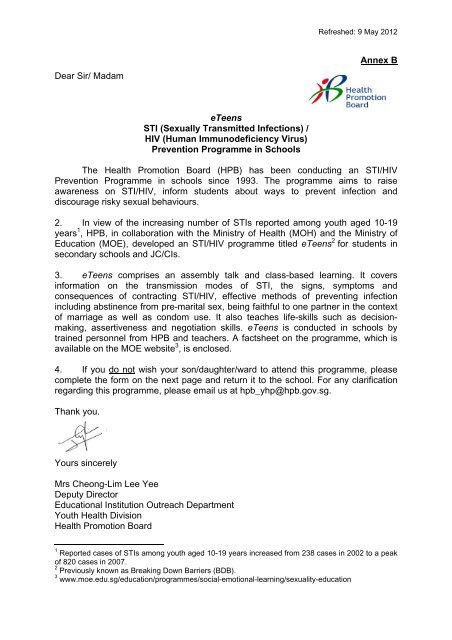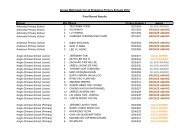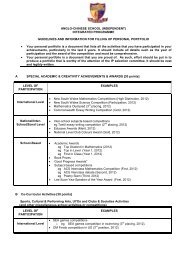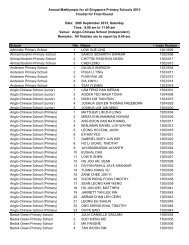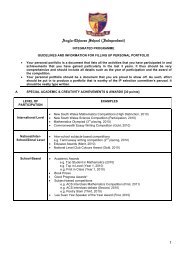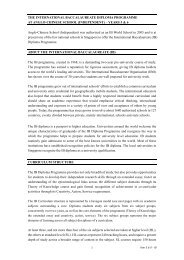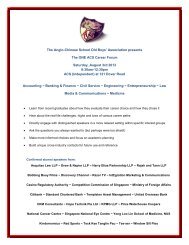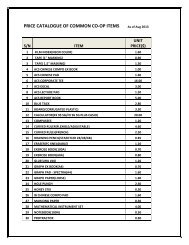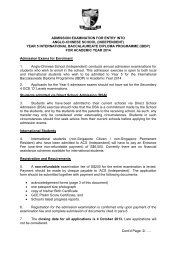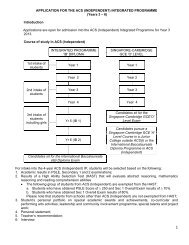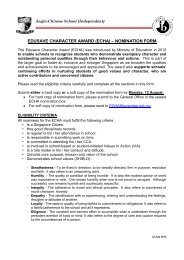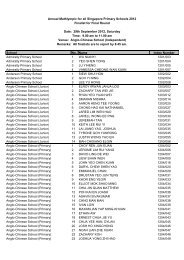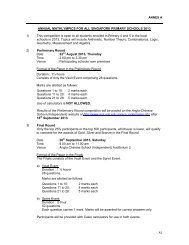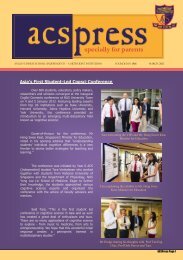here - Ministry of Education
here - Ministry of Education
here - Ministry of Education
You also want an ePaper? Increase the reach of your titles
YUMPU automatically turns print PDFs into web optimized ePapers that Google loves.
Refreshed: 9 May 2012Dear Sir/ MadamAnnex BeTeensSTI (Sexually Transmitted Infections) /HIV (Human Immunodeficiency Virus)Prevention Programme in SchoolsThe Health Promotion Board (HPB) has been conducting an STI/HIVPrevention Programme in schools since 1993. The programme aims to raiseawareness on STI/HIV, inform students about ways to prevent infection anddiscourage risky sexual behaviours.2. In view <strong>of</strong> the increasing number <strong>of</strong> STIs reported among youth aged 10-19years 1 , HPB, in collaboration with the <strong>Ministry</strong> <strong>of</strong> Health (MOH) and the <strong>Ministry</strong> <strong>of</strong><strong>Education</strong> (MOE), developed an STI/HIV programme titled eTeens 2 for students insecondary schools and JC/CIs.3. eTeens comprises an assembly talk and class-based learning. It coversinformation on the transmission modes <strong>of</strong> STI, the signs, symptoms andconsequences <strong>of</strong> contracting STI/HIV, effective methods <strong>of</strong> preventing infectionincluding abstinence from pre-marital sex, being faithful to one partner in the context<strong>of</strong> marriage as well as condom use. It also teaches life-skills such as decisionmaking,assertiveness and negotiation skills. eTeens is conducted in schools bytrained personnel from HPB and teachers. A factsheet on the programme, which isavailable on the MOE website 3 , is enclosed.4. If you do not wish your son/daughter/ward to attend this programme, pleasecomplete the form on the next page and return it to the school. For any clarificationregarding this programme, please email us at hpb_yhp@hpb.gov.sg.Thank you.Yours sincerelyMrs Cheong-Lim Lee YeeDeputy Director<strong>Education</strong>al Institution Outreach DepartmentYouth Health DivisionHealth Promotion Board1 Reported cases <strong>of</strong> STIs among youth aged 10-19 years increased from 238 cases in 2002 to a peak<strong>of</strong> 820 cases in 2007.2 Previously known as Breaking Down Barriers (BDB).3 www.moe.edu.sg/education/programmes/social-emotional-learning/sexuality-education
Refreshed: 9 May 2012eTeens Opt-out FormPlease complete this section if you DO NOT wish your child to attend theeTeens Programme and return it to the school.I, (name) _____________________________, (NRIC) ________________, do notwish my son/daughter/ward*, (name) ___________________________________ <strong>of</strong>class _________, to attend the eTeens STI/HIV Prevention Programme conductedby the Health Promotion Board.My reason(s) for opting out: My child is too young. I would like to personally educate my child. I am not comfortable with the topics/content to be covered. Religious reasons I have previously taught my child the topics/content to be covered. I do not think it is necessary for my child to attend. Others (please state): _________________________________________________________________Signature <strong>of</strong> Parent/Guardian_____________________Date
Refreshed: 9 May 2012eTeensWise.Informed.Sensible.EmpoweredAIMS OF ETEENS1. The Empowered Teens (eTeens) programme aims to provide students withaccurate information to help them make good decisions in their life choices. Itraises awareness and knowledge about the following:a) awareness <strong>of</strong> the different sexually transmitted infections (STIs) andHIV/AIDS;b) modes <strong>of</strong> transmission for STIs and HIV/AIDS;c) modes <strong>of</strong> protection against infection, specifically abstinence and thecorrect use <strong>of</strong> condoms;d) skills for decision-making, assertiveness, negotiation to say “no” to peerpressure to have pre-marital sex; ande) consequences and impact <strong>of</strong> STIs/HIV.FORMAT OF PROGRAMME2. The eTeens programme comprises two components: a mass talk segment and aclass-based programme:a) The mass talk segment is conducted by a facilitator engaged by the HealthPromotion Board (HPB) from an approved panel. The presentation followsan approved facilitation guide.b) The duration <strong>of</strong> the mass talk is about 45 minutes. It includes a multi- mediapresentation, video screening as well as facilitation <strong>of</strong> key learning points.c) The class-based programme for Secondary schools comprises 3 lessonswhich teach decision-making, negotiation and assertiveness skills. Thesuggested time for each lesson is about 40 minutes. The class-basedprogramme for JC/CI 1 students is a 1-hour lesson, which teaches studentsthe financial, physical and psychological impacts <strong>of</strong> STI/HIV infection onself and family.d) Training for teachers to conduct the class-based programme is provided forby MOE and HPB.


